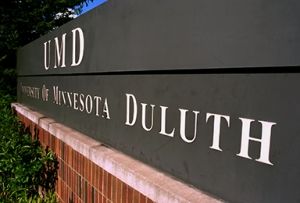News Release — For info contact Lori Melton, [email protected], 218-726-8830.
When it comes to energy research, there are a lot of players with a stake in the outcome. To spark a dialog between those various players, two groups – the Office of Sustainability and Swenson College of Science & Engineering at the University of Minnesota Duluth – hosted a two-day workshop.On May 5 and 6, local leaders, energy industry representatives, University faculty and experts in renewable energy gathered for workshops, sharing sessions, speakers and facility tours. Duluth Mayor Emily Larson was one of the speakers on the agenda for Friday morning. She discussed the City of Duluth’s energy efforts. The event was held in UMD’s Kirby Rafters each day starting at 8 am.
In addition, the National Science Foundation sponsored a new initiative called “Innovations at the Nexus of Food, Energy and Water Systems.” A speaker at the event, Claudia Neuhauser, provided an overview of this effort after Mayor Larson’s speech. Neuhauser is the Director of Research Computing within the Office of the Vice President for Research at the U of M Twin Cities campus.
The workshop agenda was as follows:
Thursday, May 5, 2016
8 am: Check-in, breakfast
8:10 am: Welcome - Christina Gallup and Mindy Granley (Director, UMD Office of Sustainability)
8:15 am: Welcome- Josh Hamilton, Dean of College of Science and Engineering
8:20 am: Local energy issues - Jodi Slick (CEO, Ecolibrium3)
8:40 am: Role of UMD research in local, regional and national sustainable energy future - Tom Ferguson (UMD Adjunct Instructor in Electrical Engineering, retired electric utility operations executive)
9 am: Breakout session
9:45 am: Sharing - report back from groups
10:15 am: COFFEE BREAK
10:30 am: UMD Research Slam - 5 minute presentations
11:30 am: LUNCH
12:30 pm: Solar projects and lessons learned - Wayne Dupuis (Environmental Program Manager at Fond Du Lac Resource Management), and Paul Helstrom (Renewable Energy Program Lead at Minnesota Power)
1 pm: Breakout session
2 pm: Sharing - report back from groups
2:30 pm: Wind project development - Barry Gartner (Renewable Project Development Leader, Minnesota Power)
3 pm: State renewable energy mandates, energy storage considerations - Ellen Anderson (Executive Director, UMN Energy Transition Lab)
3:30 pm: Discussion of the day
4:30 pm: Adjourn
Friday, May 6, 2016 Please note: People should dress for the weather, closed-toe shoes for WLSSD/Duluth Energy Systems
8 am: Coffee, breakfast, conversation
8:30 am: Funding sources and opportunities - Paul Kiprof
8:45 am The Graduate School and funding sources - Erik Brown
9 am: Duluth Mayor Emily Larson
9:15 am: Duluth’s thermal energy district - Jim Green (General Manager, Duluth Energy Systems)
9:30 am: Energy Planning and Implementation in Duluth - Erik Birkeland (Director, City of Duluth Facilities Management)
9:45 am: Overview of NSF initiative, Innovations at the Nexus of Food Energy and Water Systems (INFEWS) - Claudia Neuhauser (Director, Research Computing, Office of the Vice President for Research, UM Twin Cities)
10 am: Breakout Groups
10:30 am: Sharing - report back out from groups
11 am: Economic analysis of bioenergy and solar projects - Ellen Anderson (Executive Director, UMN Energy Transition Lab)
11:30 am: Final Breakout groups - what kinds of projects are you interested in?, how does what you do fit in?, who in this room could help you?, who could you work together with?, who are you interested in talking to?
12 pm: LUNCH
12:45 pm: Load and leave for tours, Drive-by of Duluth Energy Systems/Jim Green
1–1:50 pm: St. Louis County 30 kW solar research
2:10–3:10 pm: Western Lake Sanitary District energy and biogas
3:40 pm: Back at UMD
This energy workshop is made possible with funding from the UMN Institute on the Environment.
Swenson College has approximately 3,100 undergraduates and 220 graduate students and is home to ten academic departments, in addition to the Large Lakes Observatory, the UMD Air Force ROTC program, and the Iron Range Engineering program. The College connects students with hands-on research opportunities through its collaboration with multiple research institutions and area businesses. To learn more, visit: http://www.d.umn.edu/scse/.

